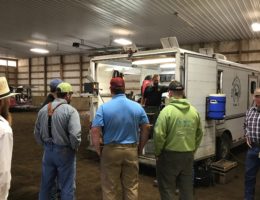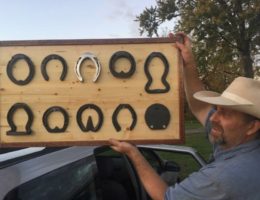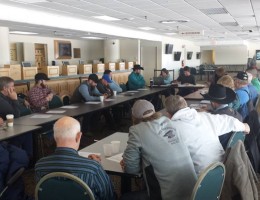Member Spotlight – Duke Snyder
Duke Snyder was twenty years old when he first started shoeing horses. While serving in the Marine Corps in 1967, there was a base stable and a Gunnery Sergeant shod the horses there. He enjoyed watching and helping the Sergeant and one day he handed the tools to Duke and told him to shoe the horse. It took him six hours, but he got it done. Not long after he shod that first horse, he was sent to Viet Nam for a year, which put his farrier career on hold until he left the Marine Corps in 1970. He then enrolled in the Oklahoma Farriers College in Sperry, Oklahoma under the tutelage of Bud Beaston for four months. Duke remembers long days of getting under as many horses as possible during the day and then forging with fellow students late into the night. It was this class that campaigned and successfully were able to get Bud Beaston inducted as a farrier into the Cowboy Hall of Fame in Oklahoma City.
Tommy Rand of Cedar Rapids, Iowa was Duke’s first mentor. He apprenticed with Tommy every Saturday in the Summer for approximately five years until 1980 and then began attending any clinic he could find. It took him about a year before he had enough clients to make a living as a farrier and hasn’t looked back since. In 1974 he shod the Budweiser Clydesdale hitch for nine months and spent about eighteen years shoeing for many a stable in the Kansas City area. He was the resident farrier instructor at Kirkwood Community College for three years.
The worst experience Duke recalls as a farrier was the time a horse pulled a nail up the entire length of his finger and clinched it. There wasn’t much he could do but wrap it up and keep on shoeing. The most rewarding part of his shoeing career has been his success in bringing foundered horses back to soundness. He learned the shoeing of foundered horses from the late great Texan, Burney Chapman. Duke believes the solid principles established by Burney are still the gold standard today Mud is what Duke likes the least about shoeing horses. Improving horse’s feet and getting them “right” is what he enjoys the most. He takes great pride in improving the foot over time to sound foot that doesn’t change between shoeings. He believes that if the horseshoe is worn at the center of the toe and the wear on both branches of the shoe is even, “You have it right!”. Looking back on his long and successful career,
Duke states he wouldn’t change a thing. Today, we have excellent manufactured shoes to choose from, but that has not always been the case. When Duke began shoeing, Diamond shoes with poorly placed nail holes was about all that was available. So during the late 70’s and early 80’s he made all his shoes. He would spend the winter making shoes for the entire year to save time while on the road. He credits Bob Peacock with getting him started forging and working with aluminum shoes, as he was doing a lot of hunter/jumpers at the time. In the 80’s, Duke spent a lot of time competing and has achieved many awards over the years. Of those awards, Duke most fondly remembers being the Midwest Champion at a contest in Wisconsin in 1988, winning over such notables as Randy Luikart. In 1989, he competed in a competition in Nebraska that required three farriers on a team where one was a Certified Journeyman Farrier, one a Certified Farrier, and one a novice who was required to nail on the shoe. His team won the competition which included his apprentice as the novice, himself as the Journeyman, and the Certified Farrier was a lady named Lynn Woods who would later become Duke’s lovely bride.
Duke was the first President of the Iowa Professional Farriers Association (IPFA). He previously was the President of the Wisconsin Farriers Association for three years when he met a young farrier at one of their clinics named Ray Legel. They hit it off and attended many clinics together and decided to begin the Iowa Association in 1984. The humble beginnings were geared toward inviting horse owners to educate them on the hoof care of their horses. Slowly but surely, the customers left the shoeing to their farrier and the IPFA became an association dedicated to the education of farriers. In this transition Duke remained the President of the Wisconsin Association for a fourth term while also beginning the first of his four years as President of the IPFA. At that time, the State Associations were all on the Board of the American Farriers Association (AFA), so Duke was in the very unique position of having two votes at one AFA meeting. He then started doing clinics in Kansas and Nebraska, helping to establish new associations in those states as well.
Rounding out his farrier career, Duke has also felt it important to attend Blacksmith Clinics as well as Farrier Clinics, which is not only a change of pace, but gives you a different perspective that will improve your shoe forging skills and enjoy creating unique items from metal. He makes knives to use in his Buckskinner hobby. Duke enjoys getting together with others who recreate the fur trapping era and he is a good hand at knife and tomahawk throwing, as well as an archer with the handmade bows and arrows that marked the lives of a time gone by.
Duke’s advice to new farriers begins with striving to make each day the best day of your clients life. Listen and care about their troubles and keep your problems to yourself. Leave your client feeling better about their day after you have been there. Learn your anatomy to best serve the horse. When you know anatomy, you can more successfully address lamenesses. You might even find that in a few cases each foot of the horse may be a different angle to best balance the whole horse. Attend a school that guarantees a lot of horses for at least six months. Attend as many clinics as you can, don’t be afraid to ask questions, and realize that oftentimes you learn more at clinics from the farriers in attendance and discussion after the clinic than what you may learn from the actual clinician. Understand that you can make a difference and you can improve the soundness of the horses in your charge. In the beginning you will be appreciated, but memories are short and more will be expected of you as you achieve new levels of skill.
Most of all, love what you do and as the saying goes, you will never work a day in your life. Duke loves being a farrier. Would he do it all over again? “Of Course!”







Follow us